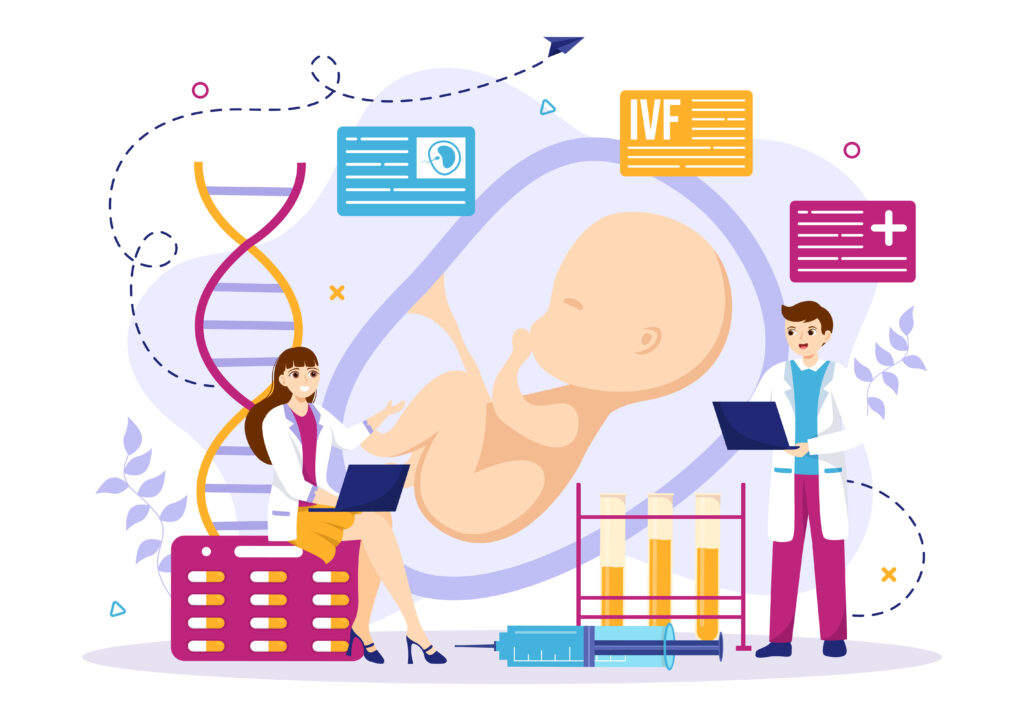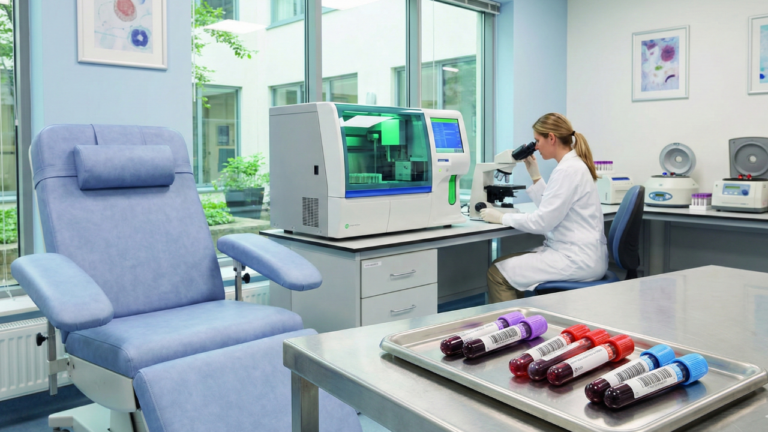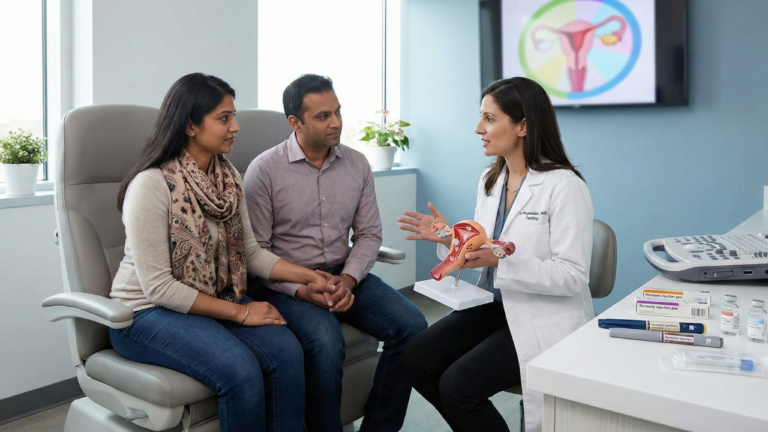The numbers are staggering – over 1.7 million children in India are born with birth defects each year, and genetic factors play a major role. Genetic Testing & Carrier Screening before starting a family could substantially reduce these numbers.
Every year in India, about 21,400 children are born with Down syndrome, 9,000 with beta-thalassaemia, and 5,200 with sickle cell disease. The carrier frequency of beta-thalassaemia varies between 3-17% among population groups of all sizes. Medical experts now recommend screening for all couples, whatever their family history might be. Genetic testing has become a powerful tool in reproductive healthcare. It helps parents learn about the potential risks of having a child with genetic disorders. Parents who test before conception have more reproductive options available to them.
This piece will guide you through genetic testing and carrier screening step by step. You’ll learn to make informed decisions about your family planning. We’ll cover everything from common screening conditions to result interpretation and available options. This knowledge will prepare you well for parenthood.
Why Genetic Health Screening Matters Before Pregnancy
Genetic disorders affect about 1 in 50 people worldwide due to single-gene disorders, and chromosomal disorders affect 1 in 263 people. Studies show that almost 65% of people face health problems from congenital genetic mutations. These numbers show why genetic health screening matters before starting a family.

The rise of inherited disorders and preventable risks
Your genes or chromosomes can develop abnormalities that cause genetic disorders. These disorders pass down through generations or happen spontaneously from new mutations. Each genetic disorder might seem rare on its own, but together they create a major health concern about 1 in 21 people have genetic disorders labelled as ‘rare’. A startling fact shows that 80% of children born with genetic disorders have no family history of the condition. This happens because many people carry genetic mutations without showing any symptoms.
People usually carry at least one genetic condition, and some carry several conditions. Two partners who carry mutations for the same condition have a 25% chance their child will inherit two non-functioning copies of the gene and develop the disorder. Research shows that 2-3% of couples carry the same genetic condition. The list of genetic disorders is so big scientists know more than 6,000 genetic disorders, and they keep finding new ones in medical research. The good news is that doctors can now treat more than 600 genetic disorders, especially if they find them early.
How genetic testing supports healthy family planning
Testing your genes before conception gives you better options than testing during pregnancy. You can explore all possible choices if doctors find any risks. As reproductive geneticist Dr. Andrew F. Wagner says, “Genetic testing gives people the information they need to plan their families”. A simple blood test, saliva sample, or cheek swab can tell if you carry mutations that might pass to your children through preconception carrier screening. Modern tests can check for about 176 genetic conditions, giving you unmatched insight into your reproductive risks.
Carrier screening helps you by:
- Finding your risk of having a child with specific genetic disorders
- Giving you time to talk with genetic counsellors about options
- Letting you take preventive steps before pregnancy
- Helping you make informed choices about reproduction
Dr. Wagner explains, “The optimal time to do carrier screening is in the preconception period, or pregnancy planning phase”. Starting early gives you more options if tests find any risks. Couples who test positive as carriers for the same condition have several choices. They can use preimplantation genetic testing (PGT) with in vitro fertilisation (IVF) to select embryos without specific genetic conditions. They might also choose donor gametes or adoption.
Normal test results give you peace of mind. Dr. Wagner notes, “Most of the time we’re sharing reassuring information. The three words that come up the most during my patient visits are ‘peace of mind'”. Doctors used to recommend genetic testing based on ethnicity, like testing African Americans for sickle cell disease or Eastern European Jews for Tay-Sachs. Now they prefer universal screening. Dr. Wagner suggests, “Since we are part of a multiethnic society and many of us may not know our exact ethnicity, I typically recommend carrier screening with a universal approach”. Genetic health screening gives you knowledge and options before conceptionright when they help you the most.
Step 1: Begin with Carrier Screening
Preconception genetic assessment starts with carrier screening. This straightforward yet powerful test shows if you have genetic mutations that might pass to your children even when you show no symptoms.

What conditions are commonly screened
Your genes undergo screening for mutations linked to various inherited disorders. The most common conditions in these screenings include:
- Cystic fibrosis: A condition causing severe damage to the lungs and digestive system
- Spinal muscular atrophy (SMA): A neurodegenerative disease affecting motor nerve cells, leading to progressive muscle weakening
- Fragile X syndrome: A genetic condition causing intellectual disabilities, particularly in boys
- Tay-Sachs disease: A fatal neurodegenerative disorder primarily affecting infants
- Sickle cell disease: An inherited blood disorder causing severe pain, infections, and anaemia
- Thalassaemia: A blood disorder reducing haemoglobin production
The original testing covered only a few conditions. Today’s expanded carrier screening panels can check hundreds of genetic conditions at once. Modern detailed panels can detect up to 500 genetic conditions. Some newer tests even screen for more than 780 genetic disorders.
Who should think over carrier testing
Every couple planning a pregnancy should get carrier screening. About 80% of children who develop a genetic disorder have no family history of the condition. This happens because many people carry genetic mutations without showing symptoms.
Carrier screening becomes vital for:
- All couples planning pregnancy, whatever their family history or ethnicity
- People with a family history of known genetic disorders
- People from populations with higher prevalence of certain genetic conditions
- Couples using assisted reproductive technology like IVF
- Consanguineous couples (related by blood)
Studies show most people carry at least one genetic condition, and some carry multiple conditions. Expanded carrier screening identifies about 70% of people as healthy carriers of at least one condition. About 2-3% of couples carry the same genetic condition, giving them a 25% chance with each pregnancy of having a child affected by that condition.
Genetic testing vs carrier screening: Key differences
Carrier screening is a type of genetic test. The difference between broader genetic testing and carrier screening helps you make informed choices.
- Purpose: Genetic testing covers a wide range of medical assessments to confirm or rule out genetic conditions or determine likelihood of developing these conditions. Carrier screening shows if you have genetic mutations that could pass to your children.
- Timing: You should get carrier screening before conception, though early pregnancy testing works too. This timing lets you explore all available reproductive options if risks show up.
- Testing method: A simple blood test, saliva sample, or cheek swab usually does the job. Results come back within 2-3 weeks.
- Frequency: You need carrier screening only once in your lifetime. Your health record should keep these results for future reference.
- Results interpretation: If you’re identified as a carrier, your partner needs testing too. When both partners carry mutations for the same condition, genetic counselling helps understand your options.
- Test coverage: Carrier screening looks mainly at recessive disorders and some X-linked conditions. These need either two copies of a mutation (one from each parent) or, for X-linked disorders, mainly affect males who inherit a mutation on their X chromosome.
The traditional 3-gene screening panel tests for cystic fibrosis, spinal muscular atrophy, and fragile X syndrome. Now, detailed panels offer greater coverage of potential genetic risks. These expanded panels work great especially when you have diverse ethnic backgrounds. Starting your genetic health trip with carrier screening gives you significant information that guides your family planning decisions. This makes it the natural first step in preconception genetic assessment.
Step 2: Explore Your Testing Options
After deciding to get genetic carrier screening, your next big step is to learn about the available testing options. The testing methods you choose will directly affect how useful your results turn out to be.
Targeted vs expanded panels
Genetic testing comes in two main forms: targeted screening and expanded carrier screening.
- Targeted screening looks at specific genetic conditions based on your family history or ethnic background. To name just one example, if you belong to an ethnic group that has higher rates of certain genetic disorders, your healthcare provider might suggest focusing on those specific conditions. Some people call this ethnic-based carrier screening.
- Expanded carrier screening tests for many disorders with a single sample, whatever your ethnicity or family background might be. These detailed panels can check anywhere from 5-10 conditions to several hundred at once. A global analysis of expanded carrier screening providers showed quite a range in the number of conditions tested from 41 to 1792, and all providers tested for only three common conditions.
Your choice between targeted and expanded screening ended up depending on what you prefer, your family history, and what your provider recommends. All the same, it’s worth knowing that about 73% of conditions on expanded carrier screening panels don’t follow strict medical guidelines. Plus, around 24% of patients might test positive for very rare conditions or genetic variants that are specific to certain ethnic groups.
Choosing between saliva, blood, or cheek swab
You can get genetic testing done using different types of biological samples. Each has its own benefits:
- Blood testing is often seen as the “gold standard” for genetic testing. Blood samples usually give more and better quality DNA, which makes them really good for detailed analysis. The downside is that you’ll need a healthcare professional to draw your blood with a needle.
- Saliva testing gives you a pain-free option you can do at home. Studies show that while saliva gives about three times less DNA than blood, it’s still enough for most genetic tests. Research found that saliva samples were successful in genotyping 96% of the time.
- Cheek swab (buccal sampling) offers another easy option where you just rub the inside of your cheek with a special swab. While it’s convenient, buccal DNA doesn’t always work as well, sometimes working only 23% of the time, and it might not last as long as saliva or blood samples.
If you’re collecting samples at home, wait at least 30 minutes after eating, drinking, smoking, or chewing gum before giving a saliva sample.
Understanding test accuracy and limitations
Genetic testing helps us learn about our genes, but it’s not perfect. Sometimes tests give wrong results. You might get a false-negative (test says you don’t have a gene mutation when you do) or a false-positive (test says you have one when you don’t). Research shows expanded carrier screening can give quite a few false-positive results. The tests also tell us just part of the story about inheritance patterns. Even if both partners carry mutations for the same condition, their child has only a 25% chance of developing that disorder. Many people misunderstand this and think being a carrier means their child will definitely be affected.
Reading test results can be tricky. Right now, only one-third of obstetricians feel confident enough to explain expanded carrier screening to their patients. This creates a real challenge since there are only about 4,000 professional genetic counsellors in the United States roughly 1 for every 82,000 people. Test results can also hit harder than expected emotionally. Studies show many women feel caught off guard by positive results even after counselling, and find the whole process makes them anxious. Almost half the women who got positive results didn’t have their partners tested, which suggests they either didn’t fully understand why they were being screened or weren’t ready for the emotional impact.
Also Read: Getting Pregnancy Ready: Your Complete Preconception Care Guide
Step 3: Timing Your Tests for Maximum Benefit
The right timing can make a huge difference in genetic and carrier screening. Your testing stage will affect what options you have and what it all means for you. Getting the timing right will give you the most value from these health checks.
Genetic test before pregnancy vs during pregnancy
Carrier screening works best before conception, giving you the most complete set of reproductive choices. Getting genetic testing before pregnancy (PPGT) helps you learn about your genetic makeup before you conceive, so you can make better informed choices about having children. Testing during pregnancy gives you fewer choices and puts you under time pressure. Prenatal diagnosis through chorionic villus sampling or amniocentesis makes it harder to do multigene testing. Your window to make decisions gets much smaller once you’re pregnant.
Preconception carrier screening has several benefits:
- You have more time to understand results without pregnancy stress
- You can think about all available reproductive choices
- You can set up specialised care during pregnancy if needed
- You might take preventative steps before conception
Why first-trimester testing is often preferred
First trimester screening happens between 11-14 weeks of pregnancy. These early tests have ultrasound checks and blood work to check for chromosomal problems. Down syndrome detection rates hit about 70% with a 5% false-positive rate. These numbers go up to 79-90% when doctors look at the mother’s age, nuchal translucency measurement, and serum markers together. Doctors often recommend first trimester testing because it spots pregnancies at risk for foetal aneuploidy and anatomic defects earlier, especially heart issues. On top of that, it lets you get chorionic villus sampling sooner if it’s available. First-trimester screening helps keep both mom and baby healthy. Finding issues early makes it easier to step in and handle potential chromosomal or genetic disorders.
When to consider preimplantation testing
Preimplantation genetic testing (PGT) looks at embryos made through in vitro fertilisation before they go into the uterus. This option works great if you or your partner have genetic mutations that could pass to your children.
PGT works best for:
- Couples who have genetic disorders in their family
- Women over 35 who face higher chromosomal abnormality risks
- People who’ve had multiple miscarriages
- Couples whose IVF cycles didn’t work
Keep in mind that PGT can’t catch all genetic problems. You might get false-positive or false-negative results, so it’s smart to get prenatal diagnostic testing even after successful PGT pregnancy. You’ll need to think carefully about PGT well before starting your IVF cycle. Getting genetic counselling is a great way to see if this choice lines up with your situation and what you want for your family.
Step 4: Interpreting Results and Managing Emotions
Genetic carrier screening results can change your life. The results need to be thought over carefully, and you’ll need support to handle the emotions that come with them.

What if you’re a carrier?
A positive carrier screening result shows you have one gene mutation for a recessive condition. Your children have minimal risk of developing that condition if your partner tests negative. However, if both you and your partner test positive for the same condition, each child has a 25% chance of inheriting both mutations and developing the disorder. They also have a 50% chance of becoming a carrier like you, and a 25% chance of inheriting no mutations. About 70% of people find they carry at least one genetic condition when tested for multiple conditions at once. In fact, 2-3% of couples carry the same condition. This makes partner testing necessary after a positive result.
Emotional effects of results and how to cope
People react differently to genetic test results. Most individuals feel surprised to learn they are carriers, even after pre-test counselling. Many describe it as an “emotional roller coaster”.
Research shows minimal negative emotional effects over time. Most participants say they’re glad they went through screening. People who get negative results often feel relieved. Carriers feel more confident about planning their families once they understand their options. Professional genetic counselling is a great way to manage these emotions. A study found that 69% of participants said their results gave them “peace of mind” or more confidence in family planning.
How to talk to your partner and family
Hereditary conditions affect whole families, so sharing results with relatives is significant. First-degree relatives (parents, siblings, children) have a 50% chance of carrying the same mutation. Second-degree relatives have a 25% chance.
When sharing results:
- Ask genetic counsellors to write family letters explaining the specific mutation
- Start with phrases like “I recently had genetic testing. Would you be interested in hearing about it?”
- Note that family members might react differently—some may feel strengthened, others anxious
This information sharing leads to what experts call “cascade testing,” which helps break the cycle of hereditary conditions through generations.
Step 5: Making Ethical and Practical Decisions
Your genetic testing results bring important decisions that need both ethical thinking and real-world practicality. These choices blend your personal values with medical guidance.
Balancing personal values with medical advice
Making ethical choices after genetic testing depends on autonomy, confidentiality, and justice. Medical professionals should guide you without pushing their values onto your reproductive choices. You’ll need to balance medical facts with your beliefs, religious principles, and family values.
Options like IVF with PGT, donor gametes, or adoption
Couples who are carriers of the same genetic condition have several paths forward:
- IVF with PGT: This method lets you select unaffected embryos, but works only if the father is heterozygous for the condition. Many couples have used this approach to avoid incompatibilities from maternal anti-D and anti-Kell.
- Donor gametes: Sperm donation starts at ₹42,190, making it one of the more available options.
- Additional options: You can choose surrogacy, embryo adoption, natural conception with prenatal testing, or adoption.
Access, affordability, and societal considerations
Physical and psychological risks of an affected pregnancy often cost less than assisted reproductive technology. Genetic discrimination remains a concern, though laws like the Genetic Information Nondiscrimination Act help protect you. These testing decisions shape society’s views of people living with genetic conditions.
Conclusion
Genetic and carrier screening is a vital tool to plan your family’s future. This piece helps you understand how early screening can reduce the risk of passing genetic disorders to your children by a lot. Testing shows that approximately 70% of people carry at least one genetic condition. This knowledge gives you more reproductive choices rather than limiting them.
The right time to get genetic testing makes a difference. Testing before conception gives you the most options and removes time pressure from pregnancy decisions. Early awareness lets you talk to specialists, look into treatments, and prepare yourself emotionally for any challenges. Scientific information and personal values play equal roles when you make decisions based on genetic test results. If you find out you’re a carrier, you have several options. These include preimplantation genetic testing with IVF, donor gametes, or adoption. People react differently to their results, but most are grateful for the knowledge and confidence it adds to their family planning.
Genetic screening benefits extend beyond your immediate family. Your test results help relatives get cascade testing, which could stop hereditary conditions from affecting future generations. Cost and access remain challenging, but screening offers peace of mind and more choices for your future. Starting a family deserves all the advantages modern medicine provides. Genetic and carrier screening, combined with proper counselling, helps build the healthiest possible foundation for your family. While no screening guarantees perfect results, this proactive step improves your chances of having a healthy child.
Key Takeaways
Understanding genetic and carrier screening before starting a family empowers you to make informed reproductive decisions and significantly reduce the risk of passing genetic disorders to your children.
- Start screening before conception, not during pregnancy – Testing before pregnancy provides the widest range of reproductive options and eliminates time pressure from pregnancy decisions.
- Everyone should consider carrier screening regardless of family history – Approximately 80% of children with genetic disorders have no family history, and 70% of people carry at least one genetic condition.
- Choose expanded panels over targeted screening for comprehensive coverage – Modern comprehensive panels can screen for hundreds of conditions simultaneously, offering better protection than ethnicity-based testing alone.
- Prepare emotionally for positive results and seek genetic counselling – About 2-3% of couples carry the same genetic condition, but professional support helps manage emotions and understand available options.
- Share results with family members to enable cascade testing – First-degree relatives have a 50% chance of carrying the same mutation, allowing them to make informed reproductive choices and potentially break hereditary cycles.
When both partners test positive for the same condition, several pathways remain available including IVF with preimplantation genetic testing, donor gametes, or adoption. The key is obtaining this crucial information early enough to explore all options thoughtfully and without pressure.
FAQs
Q1. Why is genetic carrier screening recommended before pregnancy? Genetic carrier screening before pregnancy allows couples to assess their risk of passing genetic disorders to their children. It provides the widest range of reproductive options and eliminates time pressure associated with pregnancy decisions. This proactive approach enables informed family planning and preparation for potential challenges.
Q2. Who should consider genetic carrier screening? Everyone planning a pregnancy should consider carrier screening, regardless of family history. About 80% of children with genetic disorders have no family history, and approximately 70% of people carry at least one genetic condition. Universal screening helps identify potential risks that may not be apparent from family medical history alone.
Q3. What are the different types of genetic screening tests available? There are two main approaches: targeted screening, which examines specific conditions based on family history or ethnicity, and expanded carrier screening, which tests for numerous disorders regardless of background. Expanded panels can screen for hundreds of conditions simultaneously, offering more comprehensive coverage than targeted screening alone.
Q4. How long does it take to get genetic carrier screening results? The timeframe for receiving genetic carrier screening results can vary depending on the specific test and laboratory. Generally, results become available within 2-3 weeks after the sample is collected. Some tests may provide results more quickly, while others might take slightly longer.
Q5. What options are available if both partners test positive as carriers? If both partners test positive for the same genetic condition, several options are available. These include in vitro fertilisation (IVF) with preimplantation genetic testing (PGT) to select unaffected embryos, using donor gametes, considering adoption, or proceeding with natural conception and prenatal testing. Genetic counselling can help couples understand and navigate these choices.
Disclaimer: This article is for informational purposes only and does not constitute medical advice. Always consult with a qualified healthcare provider for personalised guidance regarding fertility treatments




